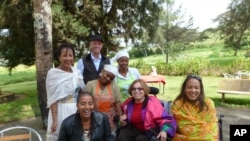The world community stands to gain a great deal through the full participation of persons with disabilities in the political, social, economic and cultural lives of their communities. That is why, in 1981, the United Nations named today, the International Day of Persons with Disabilities.
Judy Heumann, Special Advisor for International Disability Rights at the U.S. Department of State, says the designation of this day, as well as the United Nations adoption of the Convention on the Rights of Persons with Disabilities, denote what she calls a "paradigm shift." One hundred six countries have ratified the convention since 2006 and the U.S. is a signatory. Ms. Heumann says that the world is coming to understand that disability rights are not simply a health issue, but a human rights issue:
"Disabled people have been experiencing discrimination to the degree that it's been prohibiting us from really being able to participate as equal citizens within our societies. And so, what we've been working on is really efforts to help remove those barriers specifically so that disabled people can become equal participants in their societies."
Special Advisor Heumann noted that in the U.S. the removal of these barriers has meant the passage of a series of laws over nearly 50 years. Those countries that are working toward disability rights will need time.
President Obama's administration considers disability rights issues to be an important part of its ongoing diplomacy and assistance efforts. Special Advisor Heumann recently traveled to Africa and met with government, civil society, university and private sector representatives to discuss ways in which the U.S. might support implementation of the Convention on the Rights of Persons with Disabilities. The U.S. Department of State is also currently working with other U.S. agencies that operate abroad to promote disability rights in development and aid projects wherever possible.
The inclusion of disabled people "Won't happen overnight," says Ms. Heumann. But, through sharing information and technical assistance and through raising awareness, the U.S. hopes to accelerate the process.
"People of my age group, we never thought it could happen. But younger people don't really know anything different. And that's what we're really trying to achieve internationally, that as countries progress, they understand the changes that need to be made that don't just improve the life for disabled people, but improve the lives of people overall."
International Disability Rights

In 1981, the United Nations named today the International Day of Persons with Disabilities.



